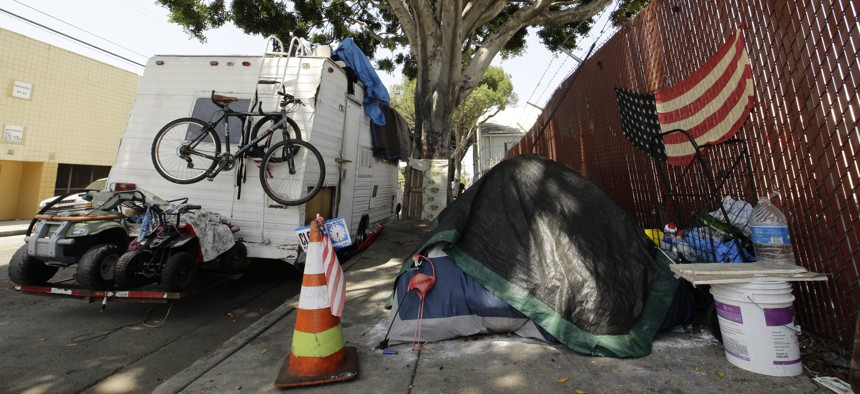Connecting state and local government leaders
In the last three years, more cities have prohibited camping, sleeping in public, sharing food, and living in vehicles.
Federal courts in recent years have struck down several local government laws that restrict what homeless people can do in public spaces, including bans on panhandling and sleeping outdoors.
But during that same time, cities across the country have adopted more legislation that advocates say effectively criminalizes homelessness, according to a new report from the National Law Center on Homelessness and Poverty. The report, released Tuesday, found that between 2016 and 2019, cities increasingly enacted laws that ban camping, sleeping in cars and sharing food.
The center has reviewed the city codes of the same 187 cities since 2006 to assess legal trends. In the last three years, cities adopted 23 laws that ban camping. In 2019, 72% of the 187 cities had at least one law in place making it illegal to camp within the city or in certain public places within the city.
The laws “serve as a tool for law enforcement to remove people from public space,” said Tristia Bauman, a senior attorney with the center.
Enforcement of bans on camping or even sleeping in public often comes in the form of an order from law enforcement to move along, Bauman said. While getting off with a warning is better than being arrested or issued a civil fine, the enforcement can put homeless people at greater risk, she said.
“The reality is it displaces people from where they are to locations where they attempt to hide and places that are less safe for them,” Bauman said.
The U.S. Supreme Court could take up the issue of camping bans in the coming term. Cities across the country have asked the high court to review a 2018 appellate court decision, which found a Boise, Idaho law prohibiting people from sleeping in public spaces was unconstitutional. In asking the Supreme Court to intervene, the League of Oregon Cities said the appellate ruling establishes “a hopelessly unworkable framework” for governments before they can enact bans, while Los Angeles noted there could be unintended consequences of allowing people to camp outside.
A filing on behalf of the Denver Downtown Partnership said that the city's camping ban hasn't resulted in police crackdowns on homeless people, saying that officers mostly offer services to people.
The center's report recommends a series of approaches the group would like cities to embrace to reduce homelessness, such as the establishment of temporary authorized encampments where services can be provided or safe parking options for people who live in vehicles.
“What we are hoping lawmakers take away from the report is this policy approach to homelessness will only fail the city and fail constituents,” Bauman said.
Cities are also increasingly targeting people who live in vehicles, according to the report. Fifty percent of the 187 cities have some type of law in place that restricts people from living in their car or van. Twenty-two of those laws were adopted in the past three years, representing a 31% increase.
Other laws that can negatively affect the homeless include bans on panhandling and sharing food. A 2015 Supreme Court decision that backed churches’ right to free speech has frequently been used as legal precedent to overturn panhandling bans. But 83% of cities have at least one law on the books banning panhandling and 29 new laws banning the practice were adopted in the last three years, the report found.
The right of religious and activist groups to share food with the homeless has come under similar legal scrutiny. While bans on food sharing are still relatively uncommon, with only 9% of cities restricting the activity, five new laws restricting food sharing were enacted since 2016.
The center’s findings come as cities across the country struggle to keep housing affordable and reduce the number of people living on the streets. Housing advocates have also raised concerns about the Trump administration’s approach to addressing homelessness, specifically a recent White House Council of Economic Advisers (CEA) report that suggested more aggressive intervention by law enforcement could help solve the problem.
Most recently, President Trump appointed Robert Marbut Jr. to head the U.S. Interagency Council on Homelessness. The former head of a San Antonio, Texas shelter, Marbut has been criticized for some of his views, including once saying it is “enabling” to feed homeless people on the street. But Marbut has been lauded by others, including Texas Gov. Greg Abbott, for his approach and has been hired as a consultant by many cities.
The National Law Center on Homelessness and Poverty report suggests that rising rents, stagnant wages, and a decline in federally subsidized housing have led to a shortage of affordable housing units and exacerbated the homeless crisis.
The report argues that long-term strategies focused on getting homeless people into housing would be more effective at addressing homelessness than the adoption of civil or criminal penalties.
“The punitive strategies for addressing unsheltered homelessness are never going to achieve that goal nor are they going to address some of the legitimate public health and safety problems raised by people living outside,” Bauman said.
To do so, cities could embrace innovative housing models, such as the use of tiny homes, to increase affordable housing stock. Local governments could also use vacant and surplus property to provide housing and shelter to residents sleeping on the street, the report says.
Andrea Noble is a staff correspondent with Route Fifty.

NEXT STORY: Opportunity Zones Investors Show Appetite for Real Estate Over Startups



